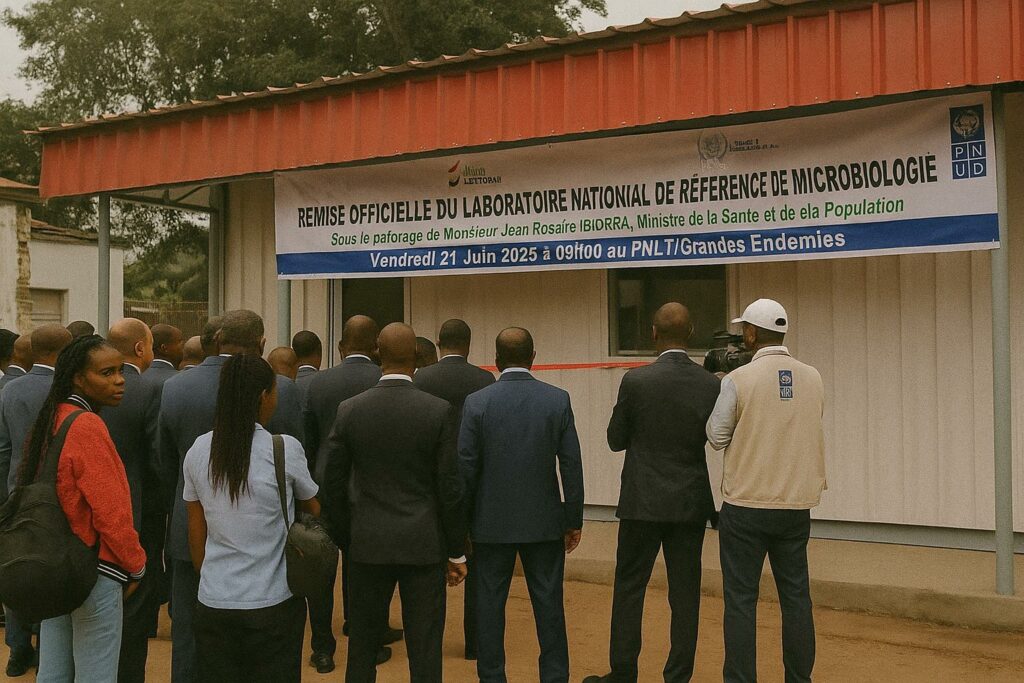A New Laboratory as a Diplomatic Signal
The hand-over of a US$2.8 million reference microbiology laboratory to the National Tuberculosis Control Programme in late June offered more than state-of-the-art equipment; it sent a calibrated diplomatic message. By receiving the keys from UNDP Resident Representative Adama Dian-Barry, Health Minister Professor Jean-Rosaire Ibara showcased Brazzaville’s readiness to operationalise cutting-edge diagnostics aligned with WHO’s End TB Strategy (WHO, 2024). The ceremony underscored the government’s resolve to pair international support with domestic stewardship, a posture that remains essential for continued trust among donors.
Epidemiological Trends Reflect Steady Gains
National surveillance data confirm that Congo detected 14 370 tuberculosis cases in 2023 with an 82 percent treatment-success rate—above the regional median of 79 percent reported by the WHO African Region. On the HIV front, the number of citizens on antiretroviral therapy rose from 26 030 in 2019 to 44 112 in 2024, driving AIDS-related deaths down by roughly 27 percent. UNAIDS modelling attributes this progress to expanded community testing, decentralised drug distribution and sustained political will, factors repeatedly cited by regional observers as core to Congo’s comparatively resilient trajectory.
The €14 Million Question
Yet success is now conditioned on a precise fiscal equation: a €14 million national counterpart over 2024-2026, or roughly €3 million annually—a modest 0.06 percent of projected national expenditure. Global Fund portfolio manager Lionel Caruana praised Brazzaville’s “notable headway” but cautioned that without the domestic share, “hard-won gains could unravel at startling speed.” His remarks align with the Fund’s co-financing policy, which seeks to deepen domestic ownership while mitigating dependency. The government’s budget circular for 2025 already earmarks health as one of three priority envelopes, a signal that the counterpart line could be secured pending final Treasury clearance.
Human Impact of a Funding Gap
Technical projections prepared by the National AIDS Council illustrate the stakes: a shortfall could leave 20 000 people without lifesaving antiretroviral medicine by end-2026 and interrupt tuberculosis treatment for 4 000 patients. Moreover, a 20 percent reduction in insecticide-treated net distribution—integrated into HIV-TB grants for logistical efficiency—would expose peri-urban districts to higher malaria transmission, thereby straining already stretched clinical services. Civil-society networks have publicly commended the Ministry of Health for acknowledging these scenarios and for maintaining an open channel of consultation with patient associations.
Regional Optics and Peer Benchmarking
Within the Central African Economic and Monetary Community, Congo’s domestic health allocation as a share of GDP rose to 3.2 percent in 2023, surpassing the bloc’s average of 2.6 percent (CEMAC Secretariat, 2024). Cameroon and Gabon, facing similar counterpart requirements, have adopted multi-year appropriations bills to ring-fence their contributions. Brazzaville’s ability to emulate such fiscal predictability will influence its diplomatic clout in upcoming African Union health financing dialogues, where credibility is earned by aligning rhetoric with ledger entries.
Navigating a Constrained Fiscal Environment
Finance Ministry insiders acknowledge that post-pandemic debt servicing and infrastructure commitments exert pressure on discretionary spending. Nevertheless, Congo’s recent issuance of a CFA-franc-denominated sustainability bond—oversubscribed by regional investors—signals market confidence that could be leveraged to prioritise health outlays. The International Monetary Fund’s 2024 Article IV consultation noted “adequate space for targeted social expenditure” provided fiscal governance reforms stay on track, a recommendation the cabinet has publicly welcomed.
From Pledges to Practice: The Road Ahead
By entrusting Minister Ibara with the mandate to secure the counterpart tranche, the Council of Ministers has embedded the issue at the heart of executive decision-making. Diplomatic observers interpret this move as a deliberate strategy to synchronise budgetary, health and foreign-policy objectives. As global attention shifts toward replenishment of the Global Fund for 2027-2029, Brazzaville’s punctual fulfilment of current obligations could position the Republic as a bellwether for responsible partnership in Central Africa. In the words of UNDP’s Dian-Barry, “Sustained national investment transforms donor grants from temporary relief into durable sovereignty.”

